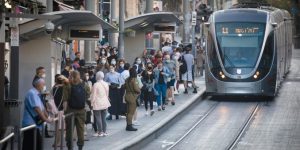Since 1967, Israel has pursued annexation policies in East Jerusalem, an area occupied during the Six-Day War but not internationally recognized as Israeli territory (Haddad & Chughtai, 2023). The essay contextualizes the JLR within the broader framework of Israeli settler colonialism, characterized by the illegal expansion of settlements, population transfers, and the systematic erasure of Palestinian communities (Abdou, 2021). The use of urban infrastructure like the JLR exemplifies this process, particularly given the historic lack of regulated Palestinian public transport in the region (Nolte, 2016).
Research and Analytical Approach
In this project, I examined the JLR as a product of two intersecting forces:
- Settler Colonialism: The rail network operates as a socio-spatial tool for deepening Israeli surveillance and state presence in Palestinian areas, facilitating settler encroachment and the displacement of indigenous populations.
- Global Neoliberalism: The JLR’s development reflects global flows of capital and discourse, integrating neoliberal logics of “modernity” and “development” while drawing on Orientalist narratives to justify its construction.
The paper demonstrates how the JLR embodies global capitalism’s ideological and material underpinnings, serving as a symbol of hegemonic power structures that marginalize Palestinian communities under the guise of urban “progress.” I also explored Palestinian resistance strategies, from grassroots protests to international advocacy campaigns targeting the JLR.

Learning Significance:
When I wrote Neoliberal Globalization Meets Settler Colonialism: The Case of the Jerusalem Light Rail, I was enrolled in a course on urban politics and global capitalism. The assignment allowed us to choose a case study that connected local urban development to larger political and economic structures. I selected this topic because it intersected my interests in Middle Eastern politics, settler colonialism, and the ways infrastructure reflects and enforces power dynamics.
Why This Topic?
I was particularly drawn to the Jerusalem Light Rail (JLR) because it represents a tangible manifestation of abstract political ideologies—settler colonialism and neoliberalism—being enacted in everyday life. It intrigued me how a project marketed as "modern" infrastructure concealed a deeply political agenda.
What Surprised Me?
While I expected to find evidence of displacement and surveillance through the JLR, I was surprised by the extent to which global neoliberal frameworks shaped its justification and implementation. For example, I learned how international investors and “modernization” narratives served to obscure the rail’s colonial functions. This nuanced my understanding of how global capitalism often bolsters local systems of oppression.
Research Process:
Primary Sources: Analyzing governmental and municipal documents on the JLR's planning and public discourse.
Secondary Sources: Reviewing academic studies on settler colonialism and neoliberal urbanism.
Credibility Assessment: I prioritized peer-reviewed journals and incorporated perspectives from Palestinian researchers and activists to ensure a balanced view.
Skills Learned and Practiced:
Critical Thinking: Identifying connections between seemingly disparate systems—colonialism and global capitalism.
Writing and Organization: Crafting a cohesive narrative that links theory and case study.
Research: Navigating interdisciplinary fields and assessing diverse sources for credibility and relevance.